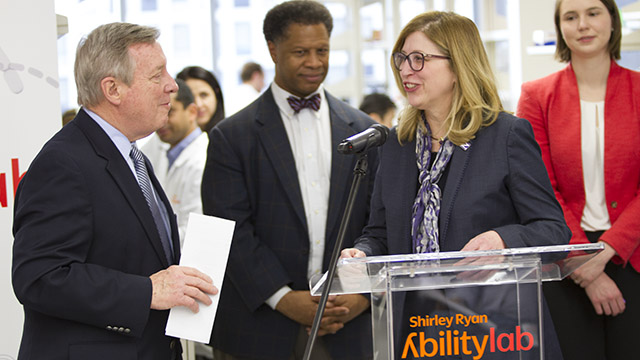March 29, 2018
A rising tide: Chicago biomedical research institutions to receive increased NIH funding in 2018
CBC is pleased to note that its member institutions, Northwestern University, the University of Chicago and the University of Illinois at Chicago (UIC), are among the many biomedical research institutions in the greater Chicago region to benefit from increased NIH funding recently approved by Congress for 2018. Specifically targeted research areas to receive increased funding include: Alzheimer’s disease, cancer, Precision Medicine, the BRAIN initiative, and infectious diseases — key strengths of the member institutions and all areas that CBC has also supported in the past and continues to support during Phase 2. U.S. Senator Dick Durbin (D-IL) shared the news at a press conference at the Shirley Ryan AbilityLab Tuesday, March 27, 2018 (see below).
Contributed by: Jola Glotzer
Durbin Discusses New Federal Investments In Medical Research
Senator Dick Durbin Official Website | Press Relase | March 27, 2018

Pictured are Durbin (left), Dr. Robert Winn, director of the University of Illinois Cancer Center, and Teresa Woodruff, professor and vice chair for research in obstetrics and gynecology, dean of The Graduate School and director of the Women’s Health Research Institute, Northwestern University (at the podium). Source: Northwestern Now
CHICAGO – U.S. Senator Dick Durbin (D-IL) [today] announced new federal investments included in last week’s omnibus spending bill that will help Chicago’s biomedical research institutions continue their important work creating new technologies and finding ways to treat and cure disease. The Fiscal Year 2018 omnibus includes a $3 billion (or nearly 9 percent) increase for the National Institutes of Health (NIH), a $1 billion (or 14 percent) increase for the Centers for Disease Control and Prevention (CDC), and a $1.49 billion (or 5 percent) increase for Department of Defense (DOD) medical research.
“The Fiscal Year 2018 funding bill represents a significant and important victory for medical research nationwide and here in Chicago,” Durbin said. “I’ve made it a priority to ensure that the federal government is doing its part to make sure young researchers and bright scientists have the funding they need to develop new vaccines and discover treatments and cures for diseases like cancer and Alzheimer’s. Life-saving and life-improving advances – whether funded by NIH, by the CDC, or by the DoD– will only be realized if we continue on a steady, predictable growth path of investment in biomedical research.”
Durbin was joined by leaders from the Shirley Ryan AbilityLab, Northwestern University, University of Chicago, University of Illinois, Rush University Medical Center, and Lurie Children’s Hospital – all of which receive millions in NIH funding.
After years of underfunding America’s research institutions, Congress has now increased NIH funding for the third year in a row. The Fiscal Year 2018 omnibus includes targeted increases for research on Alzheimer’s disease ($414 million increase); cancer ($275 million increase); Precision Medicine ($60 million increase); the BRAIN initiative ($140 million increase); and infectious diseases ($353 million increase). Illinois institutions receive more than $800 million in NIH funding each year – this funding creates jobs in Illinois and it leads to medical breakthroughs that help improve and save lives worldwide.
The spending bill increases CDC funding by 14%, including a $350 million increase for opioid overdose prevention, surveillance, and enhancement of state prescription drug monitoring programs. It also includes notable CDC increases for infectious diseases and preparedness, chronic disease prevention, violence prevention, global health, and childhood lead poisoning.
The spending bill also includes a $1.49 billion increase for medical research at the Department of Defense, so it can continue to support breakthrough research for service members, military families, and veterans.
Source:
Adapted (with modifications) from Durbin Discusses New Federal Investments In Medical Research, published on March 27, 2018.
